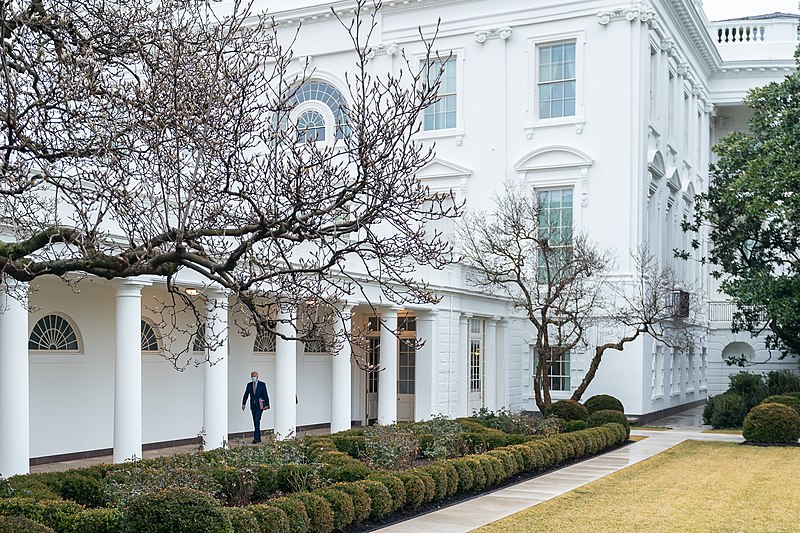One of the concerns Republican lawmakers have expressed towards Joe Biden’s infrastructure plan was the rise in corporate taxes and its economic effects. However, Biden maintained that there has been no evidence that an increase in corporate taxes would prove to harm the economy and drive businesses overseas.
Speaking to the press upon returning from the Camp David presidential retreat over the weekend, Biden defended his proposal to raise corporate taxes back to 28 percent.
Biden noted that there are 50-51 corporations on the Fortune 500 list that did not pay taxes for the past three years and said that it was time that they pay their share. When pressed regarding the claim that the corporate tax increase would drive away corporations to go overseas, Biden said there is no proof of such a scenario happening so far.
Back in 2017, Biden’s predecessor Donald Trump and the Republican-controlled Senate cut the corporate tax rate from 35 percent to 21 percent. Trump also kept insisting that his administration would work on improving the country’s infrastructure, but no plans have been proposed or implemented.
Aside from Republicans, Biden’s proposal has also drawn the ire of West Virginia Democrat Joe Manchin, whose support is crucial in an evenly-divided Senate despite Democratic control.
White House Press Secretary Jen Psaki told the press that Biden was open to discussions with lawmakers from both parties on how to fund the investments. Manchin has said he would accept 25 percent being the highest the corporate tax rate would get, and when pressed regarding the rate, Psaki noted that the 28 percent would already be lower than it was at any time since World War II.
In other news, State Department spokesman Ned Price suggested the possibility that the United States and its allies would boycott the 2022 Olympics that are scheduled to be held in Beijing. The boycott would be due to the country’s human rights violations. Price said that a coordinated boycott is something the administration would hope to discuss, noting the sanctions the US, Canada, the UK, and the European Union placed upon China for its human rights violations in Xinjiang.



 Iran Supreme Leader Ayatollah Ali Khamenei Killed in Israeli, U.S. Strikes: Reuters
Iran Supreme Leader Ayatollah Ali Khamenei Killed in Israeli, U.S. Strikes: Reuters  Why did Iran bomb Dubai? A Middle East expert explains the regional alliances at play
Why did Iran bomb Dubai? A Middle East expert explains the regional alliances at play  HHS Adds New Members to Vaccine Advisory Panel Amid Legal and Market Uncertainty
HHS Adds New Members to Vaccine Advisory Panel Amid Legal and Market Uncertainty  UK Accepts U.S. Request to Use British Bases for Defensive Strikes on Iranian Missiles
UK Accepts U.S. Request to Use British Bases for Defensive Strikes on Iranian Missiles  Does international law still matter? The strike on the girls’ school in Iran shows why we need it
Does international law still matter? The strike on the girls’ school in Iran shows why we need it  U.S.-Israel Strike on Iran Escalates Middle East Conflict, Trump Claims Khamenei Killed
U.S.-Israel Strike on Iran Escalates Middle East Conflict, Trump Claims Khamenei Killed  Suspected Drone Strike Hits RAF Akrotiri Base in Cyprus, Causing Limited Damage
Suspected Drone Strike Hits RAF Akrotiri Base in Cyprus, Causing Limited Damage  Russia Signals Openness to U.S. Security Guarantees for Ukraine at Geneva Peace Talks
Russia Signals Openness to U.S. Security Guarantees for Ukraine at Geneva Peace Talks  Trump to Address Nation as U.S. Launches Strikes in Iran, Axios Reports
Trump to Address Nation as U.S. Launches Strikes in Iran, Axios Reports  Trump Says U.S. Combat Operations in Iran Will Continue Until Objectives Are Met
Trump Says U.S. Combat Operations in Iran Will Continue Until Objectives Are Met  Argentina Tax Reform 2026: President Javier Milei Pushes Lower Taxes and Structural Changes
Argentina Tax Reform 2026: President Javier Milei Pushes Lower Taxes and Structural Changes  Trump Announces U.S. Strikes on Iran Navy as Conflict Escalates
Trump Announces U.S. Strikes on Iran Navy as Conflict Escalates  Australia Rules Out Military Involvement in Iran Conflict as Middle East Tensions Escalate
Australia Rules Out Military Involvement in Iran Conflict as Middle East Tensions Escalate  Macron Urges Emergency UN Security Council Meeting as US-Israel Strikes on Iran Escalate Middle East Tensions
Macron Urges Emergency UN Security Council Meeting as US-Israel Strikes on Iran Escalate Middle East Tensions  EU Urges Maximum Restraint in Iran Conflict Amid Fears of Regional Escalation and Oil Supply Disruption
EU Urges Maximum Restraint in Iran Conflict Amid Fears of Regional Escalation and Oil Supply Disruption  Failure of US-Iran talks was all-too predictable – but Trump could still have stuck with diplomacy over strikes
Failure of US-Iran talks was all-too predictable – but Trump could still have stuck with diplomacy over strikes  U.S. Deploys Tomahawks, B-2 Bombers, F-35 Jets and AI Tools in Operation Epic Fury Against Iran
U.S. Deploys Tomahawks, B-2 Bombers, F-35 Jets and AI Tools in Operation Epic Fury Against Iran 































